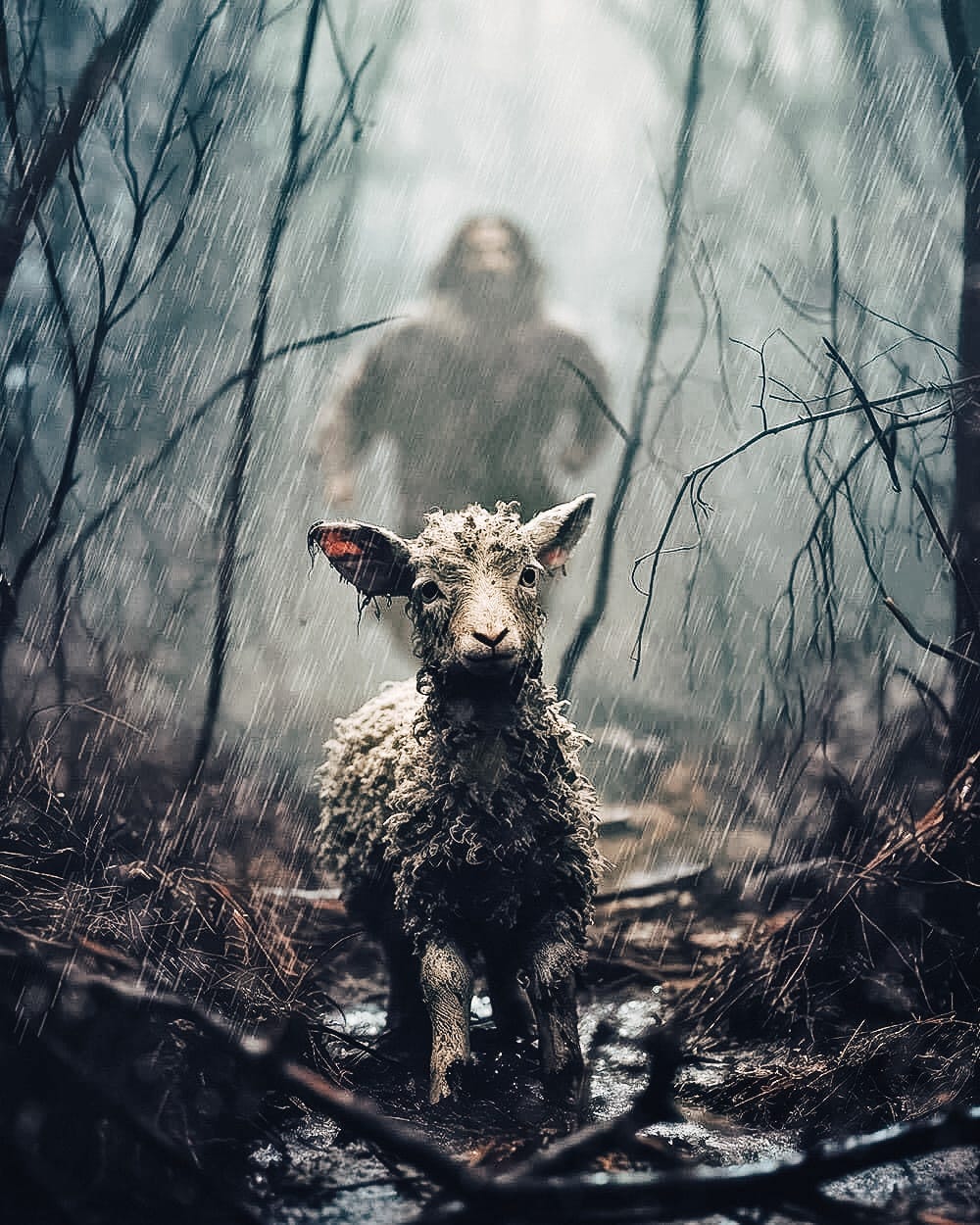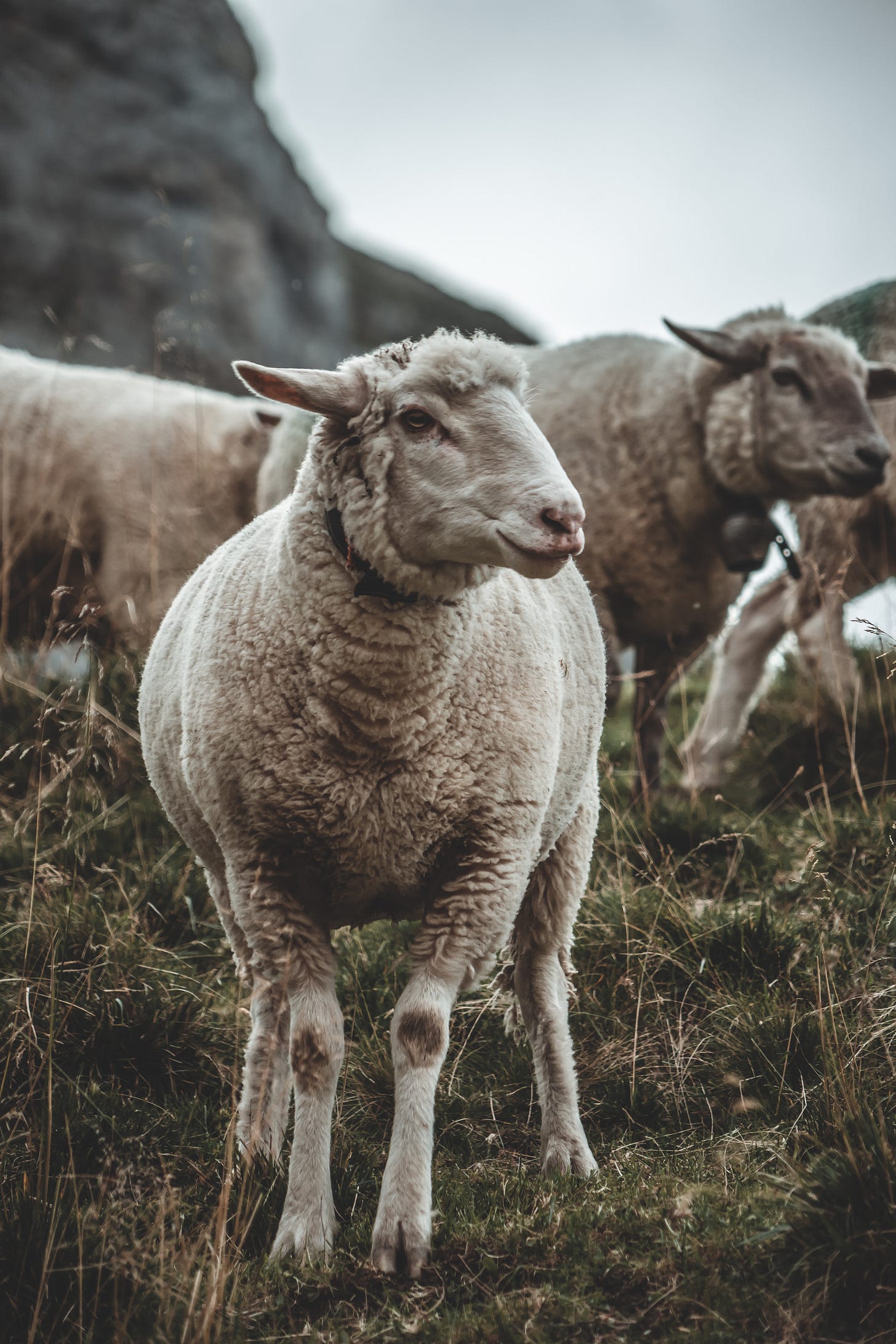Hi, everyone!
Last month, I said I was ready for cooler temperatures, but I might be rethinking that statement. Sheesh, it’s been cold.
I can’t believe we are saying goodbye to another month. December is on our heels, which means we are also on the cusp of a new year. It's crazy how rapidly time slips through our fingers!
As we close out November, here is something I have been pondering for the last two years.
Of Sheep and Shepherds
My friend Randy sent me the picture above a while ago. I knew what it meant to her, and she knew what it would mean to me.
When seeing it, it’s hard to explain how my body responded (and still responds). It’s as if breath simultaneously escapes and fills my lungs. The old stagnant air of shame, grief, anxiety, insecurity, and fear is released, and I inhale the fresh air of belonging, comfort, security, assurance, and, most of all, profound love.
The adage that a picture is worth a thousand words rings true here. This singular image speaks the truest, most comprehensive tale of not only my story and your story but also of God’s story—that of the Shepherd and his sheep.
I have been a shepherd. But I am ever and always a sheep. All shepherds are. There is only one true shepherd, and his name is Jesus. The rest of us are his sheep.
Whenever Scripture is repetitive, I can’t help but lean in and listen closely. The Bible speaks extensively about sheep and shepherds. Passages like Psalm 23, Jeremiah 23, Ezekiel 34, and John 10, when read together, both comfort me as a sheep and make me tremble as one who has been a shepherd. These passages make it clear that God profoundly loves his sheep, which means he also cares greatly about how the shepherds care for them.
Three things about sheep:
The Scripture has much to say about us as sheep, but here are three things I’ve been pondering lately:
We are valuable: In Luke 15, Jesus shares three parables centered around the theme of loss—the lost sheep, the lost coin, and the prodigal son. A common thread runs through each parable: the one who lost something is deeply grieved over its loss, and they are overjoyed when it is found, so much so that they invite others to rejoice with them over its return! These parables convey a fundamental truth: the lost item is of significant value to the person who lost it.
Do you believe that you are valuable to Jesus? Sometimes, it’s a stretch for me. I believe Jesus is good, and because he is good, he gave his life for me. I always view that as a statement of who he is rather than who I am. And that IS true. But it is ALSO true that, as God’s sheep, we are immensely valuable to him.
We are vulnerable: While the Scripture provides a robust picture of the gravity of our sin, it also has much to say about our vulnerability. In Ezekiel 34, God’s sheep are vulnerable to affliction. They are lost, injured, scattered, hungry, weak, neglected, misused and abused, and alone.
As God’s sheep, we need a shepherd's attentive protection and care. But, just as they did in Ezekiel 34, God’s shepherds sometimes fail to care for God’s people. Sometimes, they even neglect and abuse them—ruling them with force and harshness (vs. 4). And this is something God takes very seriously.
We belong to The Good Shepherd: In Ezekiel 34, God chastises Israel’s shepherds and declares that, because of their neglect and mistreatment of his sheep, he will be the shepherd of his people. We see this fulfillment in Jesus when he declares he is the Good Shepherd (John 10). And where other shepherds failed to care for his sheep, Jesus does not, will not fail.
We belong to him. He knows his sheep. Each one. By name. His eyes are always on us. He knows where we are and what we need at every moment. And he is dedicated to his flock. Each one. So much so that if one of his beloved sheep goes missing, he will leave the others to bring them back into his fold.
Two things about shepherds
The role of shepherds is prominent throughout the Scriptures. They are those whom God has entrusted with the care and oversight of the children of Israel. One particular passage in the New Testament I keep returning to is Jesus’ interaction with Peter in John 21:15-19. The central focus of this passage is Jesus’ intent to restore Peter and reaffirm his call after he denied Jesus three times. But Jesus’ words to Peter also reaffirm how much he values his sheep.
Jesus’ last recorded words to Peter before he ascended to the Father included instructions about caring for his sheep, which means our need was at the forefront of his mind.
Shepherds are called to feed God’s sheep: In the Old Testament, God rebuked prophets and priests for failing to speak the truth to his people (Jeremiah 6:13-14). The Lord calls his shepherds to feed his sheep with the life-giving, sustaining truth of Christ. Shepherds should not withhold anything beneficial or helpful to God’s sheep—including everything from Christ’s profound love for humanity to the grave nature of sin. Jesus wants his sheep to flourish, and for that to happen, shepherds must lead the sheep into the green, nutrient-rich pastures of the Gospel.
Shepherds are called to care for God’s sheep: In Ezekiel 34, the Lord rebukes Israel’s shepherds for failing to provide care. They did not strengthen the weak, heal the sick, bind up the injured, or seek out the lost. To make matters worse, they ruled over them with force and harshness. This passage teaches that God not only desires his sheep to be tended to but also cares about how the shepherds care for his sheep. As a pastor friend once said, we can do things that Jesus calls us to do but in a way that looks nothing like Jesus. As one who has been in the role of a shepherd, this passage causes me to pause, reflect, confess, and repent for all the ways I have not cared for God’s sheep in God’s way. And it is a passage that should cause all shepherds to re-assess how they both view and treat God’s sheep.
One thing about The Good Shepherd
In his book, A Shepherd Looks At Psalm 23, former real-life shepherd Philip Keller said sheep will only lie down if four conditions are met. They are free of fear. They are free from friction with other sheep. They are free of the torment of flies and parasites. And they are free from hunger. Keller goes on to state that “It is significant that to be at rest there must be a definite sense of freedom from fear, tension, aggravations, and hunger” and that only the shepherd “makes it possible for them to lie down, to rest, to relax, to be content and quiet and flourishing.”
In John 10, Jesus declares that he is the Good Shepherd. He is the fulfillment of what all of the previous shepherds failed to be. Where other shepherds neglected, rejected, and mistreated God’s sheep, Jesus died for his sheep. Where other shepherds satisfied themselves by feeding on the sheep, Jesus offered up his body and blood as their food. Where other shepherds failed to protect God’s sheep from affliction, Jesus bore their afflictions in his own body. Where other shepherds fled when threats arose, Jesus placed himself in the direct path of the threat, protecting us with his own life. Where other shepherds allowed sheep to wander away or get separated from the flock, Jesus sought (and continues to seek out) his sheep, intent on bringing them back into the fold where they belong.
And because this is who Jesus is for you and me, we can lie down and rest.
Advent Starts on Sunday
Advent begins this Sunday, December 3rd!
I created an Advent study to help us slow down, engage the Scriptures, and encounter Jesus during this season.
If you aren’t familiar with Advent, it comprises the 40 days leading up to Christmas and is a time to reflect on love, hope, peace, and joy. It is also about celebrating the birth of Christ, the fulfillment of a long-awaited promise.
For me, Advent feels like waiting, anticipating, and longing for Christ to return.
The study comprises four lessons, aligned with the four weeks of Advent, and explores four ways we encounter Jesus in the Gospel of John: Lamb of God, Bread of Life, Good Shepherd, and Great High Priest.
It is a self-paced, video-based resource with 12 instructional videos that will walk you through the biblical narrative of God’s provision for us in Christ. Additionally, you will receive a comprehensive 60-page downloadable workbook to help you further engage the Scriptures and encounter Jesus.
I hope you’ll consider joining me this Advent as we look at God’s provision for us in Christ!
But there are many incredible Advent resources out there, so if you don’t join me, here are a few others I recommend:
(Reading Plan) Bible Project’s Advent Reflections on You Version
(Book) Advent: The Season of Hope, by Tish Harrison Warren
(Book) Shadow and Light, by Tsh Oxenreider
(Music) Behold the Lamb of God, Andrew Peterson
That’s it for now! What about you?
What are some of your favorite Advent resources?
What are some ways you’ve encountered Jesus?
Love you guys!
CC
The Wholehearted Project is reader-supported.
If you enjoy or have benefitted from the content, would you consider supporting future content in a few ways:
Like or comment below.
Become a financial supporter through a one-time gift at Buy Me A Coffee or a recurring supporter at Liberapay.
Share this newsletter with others:
Subscribe to receive regular updates:







